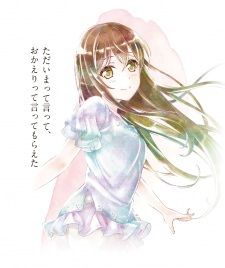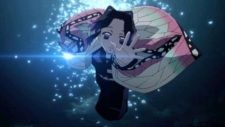
There are few anime as equally enjoyable as they are remarkable. And there are fewer still as thoroughly pleasant as Sunrise's latest foray into the world of school idols. Love Live: Nijigasaki is a wholesome reminder of why I enjoy anime, and of why the slice-of-life genre is so captivating. Admittedly, after the middling and sometimes frustrating experience that was Sunshine, I wasn't too sure what to expect from this year's offering of Love Live. While I was a big fan of the original series (Nico is my favourite character in all of anime), Sunshine missed the mark in many regards. It forgot what made LoveLive so special in the first place— charming characters and cute slice-of-life— and decided instead to replace it with unhappy vibes and drama in excess. Sunshine was always walking in the original's shadows, with abundant references to Muse, and of days gone by. The great news is that, by bringing the series back to its roots, Nijigasaki firmly stands on its own two feet. It is comprised solely of the franchise's best elements, and highlights the reasons so many people fell in love with Love Live all those years ago. And, with a few important changes and some new layers of complexity, I believe that it is legitimately superior to the original. Love Live's third outing is its best yet. A large part of what makes Nijigasaki such a pleasure to watch is that it doesn't take itself too seriously. The tone here is far more light-hearted and slice-of-life focused than previous, which is when Love Live had always shined the most, from my perspective. While there is still a degree of drama, it is used sparingly, and in a wholesome and heartwarming manner, with the conclusion to the conflict almost invariably resulting in a smile or even a big stupid grin. If you're the type of person who watches anime primarily for fun, I would say there are not many anime that do it better than Nijigasaki. If you're not so much a seeker of fun, and instead have a preference for the dark and violent and so forth... well, you've found yourself in the wrong place, I'm afraid. I've always found it admirable how Love Live manages to develop large casts of characters in such a concise amount of episodes, and Nijigasaki is the best example of this to date. It bumps the size of the main cast from nine to ten, and rather than the characterization taking a hit as a result, to the contrary, it is actually an improvement over previous seasons. Each of the girls, no matter how boring or forgettable their design may initially suggest, receive at least one full episode developing their character in a meaningful way, giving ample reason for you to care about them. Contrast this with Sunshine, where I remember Saint Snow, the darn rival group, more than the actual main cast, and it is a world of difference in quality. Even the original series had some characters I felt were underdeveloped (Nozomi in particular), but such is scarcely the case here. The best example of character development done right is with Rina's episode. Personally, and I am sure many felt the same way initially, her character design elicited a sigh and rolled eyes. Her face being covered by a computer monitor, complete with kaomoji and other electronic expressions, felt very much like an unabashed attempt to bank off on the V-Tuber craze of today. But Rina's episode actually creates a valid reason for her possessing this quirk. It makes sense in the context of the anime, and it genuinely makes you feel happy for her in how she has found a way to confront her fears. Without this episode, she would be another Yohane— one-note and defined by a single gimmick— but with it, she has earned her place as a (relatively) believable and dynamic character. My personal favourites are Emma and Yuu. While there isn't anything too noteworthy going on with Emma as a character, she is adorable as all hell, as well as being from my favourite country (Switzerland). It is not often that westerners take the role of a main character in anime, and if they do, they are often either half-Japanese or a caricature with blonde hair and broken Japanese. But Emma is just a normal girl, treated no different than any of the other girls. This is laudable on Sunrise's part, as it demonstrates that they are more broad-minded and accepting of other cultures than most studios. It is the little details such as these which make the Nijigasaki girls so appealing. Of course, with it now being the third full Love Live series, it does follow a formula that most fans have grown accustomed to. But where the first two series spent the majority of their first seasons merely building up and assembling the idol club, Nijigasaki is done with this in its first few episodes, and swiftly moves on to character development and other matters. The only aspect I wish were different was that, maybe, this time around, the girls could have all started together from the first year of high school. I always thought it was a shame that Love Live had to end after a single year of story, and would much prefer to see a full three years played out instead. This is especially true in the case of Nijigasaki, as the cast is so vibrant and exciting that the thought of it ending after two seasons (provided we are even lucky enough to get that far) just doesn't sit right. But, I suppose, it is always better to end on a high note than to risk meandering about. There are considerably strong yuri themes within Nijigasaki. Unlike the other Love Live series, and most slice-of-life in general, it doesn't exist merely as a suggestion or as fanservice, but as something more sober and markedly human. One of the main characters is genuinely— that is, objectively—in love with one of the others. While this initially comes off as a bit of a shock when it is revealed, especially with it occurring so late into the season, it is handled in a surprisingly mature manner, and ends with a hell of an emotional closer. While my first thoughts were "Oh no..." when I realized things were going down the oft-trodden yuri path, the events of these two episodes earned my support, and this comes from someone who isn't even a fan of yuri. Sure, hell, I'll even cheer the two of them on, and hope that everything works out between them in the end. This yuri romance also adds a new layer of complexity to the story. Though I was already enamored with the anime by this point, it went above and beyond, taking a large risk that could very well have sabotaged my enjoyment and appreciation of the anime. But it is a risk that paid off, and I am interested in seeing where this romantic substory arrives at in the second season. The events of these two episodes do steal the focus away from what was otherwise a very slice-of-life centric anime, however, which may not be to everyone's tastes. But as long as Nijigasaki balances the two, and doesn't let the romance overtake the slice-of-life, then I believe the two aspects can peacefully co-exist and compliment one another. Love Live: Nijigasaki is a delightful and remarkable experience throughout. It is some of the most fun I have had watching an anime in... well, if not just a long time, then perhaps ever. If you enjoy slice-of-life anime to any extent, then, even if you have watched Love Live in the past but were irked for some reason or another, I would strongly urge you to give Nijigasaki a chance as it is a different beast entirely. This isn't just an anime for Love Live fans, or idol fans— it is a love letter to slice-of-life fans as a whole. In a lot of ways, Nijigasaki feels like the successor to K-ON (complete with its own Azusa equivalent), to which I feel like Nijigasaki has firmly surpassed. Its slice-of-life moments are more fun. Its music is more charming. Its characters are more compelling. Hell, it even handles yuri better. So where does that leave me, as someone whose favourite anime, for several years, was K-ON? While the second season still remains an unknown entity, Love Live: Nijigasaki, in my opinion, is poised to be one of the most lovable slice-of-life anime in over a decade.

















